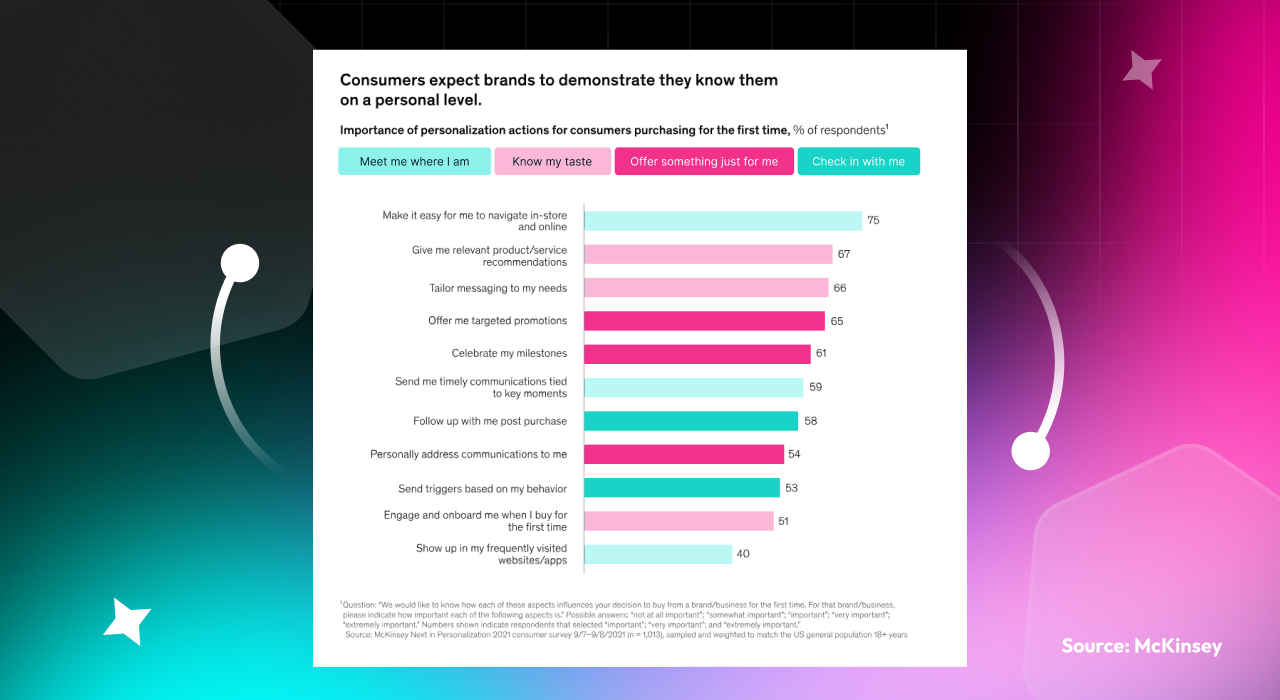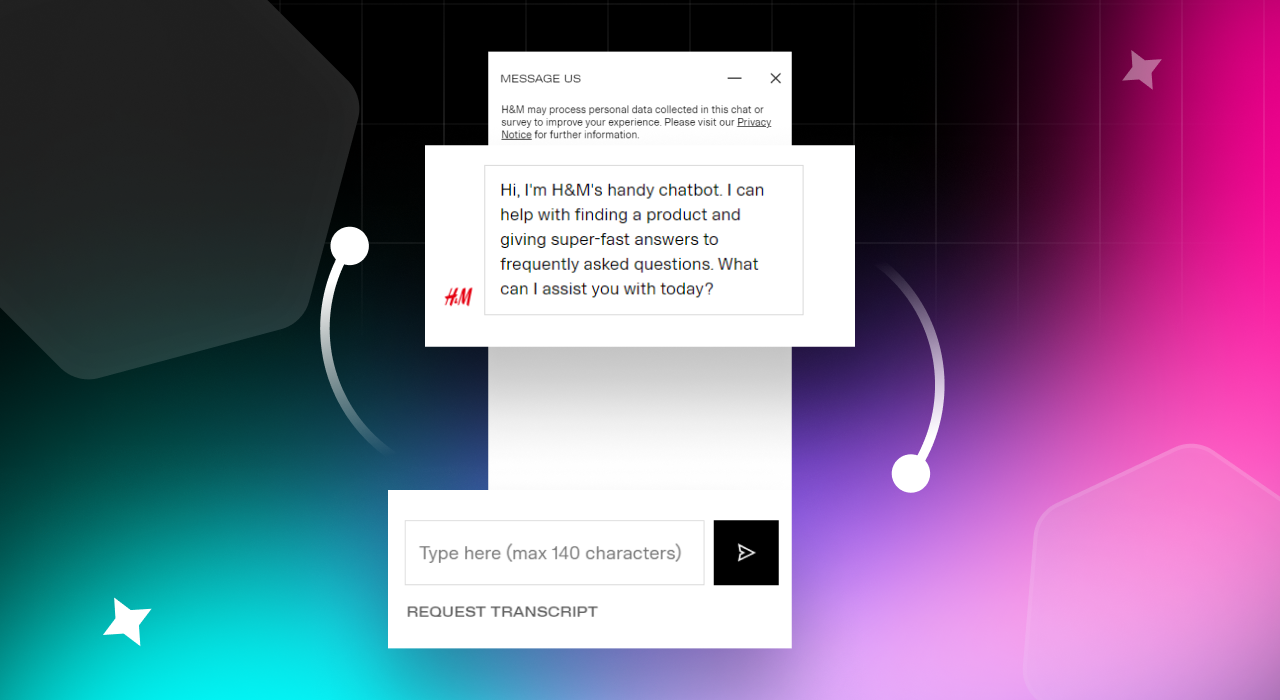Advancements in technology are offering companies opportunities to improve their customer experience. A report by NewVantage Partners shows that around 99% of Fortune 1000 companies are investing in AI.
AI tools are helping companies offer more efficient and personalized interactions to customers. These applications include chatbots, virtual assistants, and personalized recommendations.
According to Capterra’s 2023 CX Investments Survey, 65% of companies use AI. The survey also shows that 64% of businesses are using AI for customer self-service solutions. With the power of AI, companies can create more meaningful connections and drive customer satisfaction to new heights.
AI can also help businesses streamline customer service processes by lowering response time and increasing efficiency. Automated chatbots can handle routine inquiries and tasks. This helps free up human agents' time to focus on complex issues and offer better service.
Let’s discuss how AI can be used to enhance customer experience.
Personalized Recommendations
AI has become an important tool for businesses looking to provide personalized recommendations to their customers. AI can tailor suggestions to match individual preferences and needs by analyzing customer data. Machine learning algorithms can study customer behavior through browsing history or past purchases to predict what they might like or need next. Stats show that 80% of customers prefer to do business with a company that offers a personalized experience.
For example, eCommerce platforms like Amazon use AI-powered recommendation engines to suggest products depending on a customer's past purchases and browsing behavior.
Personalized recommendations also impact sales and customer loyalty. Research from McKinsey shows that companies excelling at personalization generate 40% more revenue than those with average performance. Customers are more likely to purchase when they receive suggestions that interest them. This increases sales for businesses and encourages repeat visits.

AI-Powered Customer Support
AI-powered customer support is also a game-changer for companies. AI chatbots simplify customer support by quickly answering commonly asked questions 24/7 and resolving simple issues. This ensures customers receive timely help that improves their overall experience.
Virtual assistants take this a step further by handling routine inquiries and tasks. They can reduce the inquiries to about 70% across different mediums. They are ideal for managing simple requests like booking appointments or updating account information. This enables human agents to focus on addressing more technical concerns.
Many companies have successfully implemented AI-powered customer support. For example, H&M uses an AI chatbot on its website to help customers find clothing items based on their preferences.

Similarly, Sephora's virtual assistant allows customers to book appointments from Facebook. This increased the booking rate by 11%. These examples show how AI can improve customer support and make it more efficient.
Predictive Customer Service
AI can also help businesses guess what customers might need before they even ask. This is called predictive customer service. It can help businesses spot potential issues and offer opportunities to improve the customer experience.
AI predictive analytics can examine data and customer behavior from purchase history and browsing patterns. Companies can also use this data to address customer needs proactively. For example, if a customer frequently buys a particular product, AI can predict when they might need a refill and offer timely promotions or reminders.
Salesforce research shows personalized recommendation increases average order value by 10%. Predictive customer service also offers several other benefits. By anticipating customer needs, businesses can prevent issues before they escalate. This will lead to fewer complaints and higher customer satisfaction while saving business time.
Advanced Analytics for Customer Insights
AI can gather and analyze large amounts of data. This offers companies insights to tailor their strategies to enhance customer experience. AI can analyze customer data and feedback to spot patterns and trends that might not be immediately visible.
AI can also drive insights from customer interactions and purchase history. This can help companies learn which products are popular, what issues customers face, and how satisfied they are with their experiences. For instance, if many customers express frustration with a specific feature, a company can work on improving it.
These insights can also drive strategic business decisions. Companies can use the data to refine their marketing strategies, better understand specific customer segments, and create personalized campaigns.
Real-Time Personalization
Real-time personalization is another powerful way businesses enhance their customer experiences. This approach relies on real-time data processing that helps companies respond quickly to customer behavior. It can also help businesses offer the most relevant content at the right time.
Real-time personalization continuously monitors customer actions. This includes customers browsing or adding items to a cart. After processing this data, AI can help adjust offers and content on the fly.
This makes customers feel special because they get things that match their interests at that exact moment. It also helps businesses sell more because people are more likely to buy something they really like.
Omnichannel Integration
Omnichannel integration can also improve customer experience across multiple platforms. It ensures that customers receive consistent service, whether they are shopping online or in-store.
An omnichannel customer experience means that all customer interactions are connected and cohesive. For example, a customer might browse products on a site and then visit a physical store to make a purchase.
In a true omnichannel experience, all these interactions are linked, allowing the customer to move between channels effortlessly without losing context or having to start over. This creates a smooth, integrated experience that enhances customer satisfaction and loyalty.
AI offers businesses a complete view of each customer’s journey. This can help companies understand how customers interact with their brands so they can tailor their services accordingly. For instance, if a customer adds items to their cart but does not purchase them, AI can send them a follow-up email with a reminder or a special offer.
Many companies are leveraging AI for omnichannel integration to enhance the customer experience. For example, Starbucks uses its mobile application to allow customers to order ahead and pay online. Customers can earn rewards points that are automatically tracked, whether they order through the app or in-store.

Customer Segmentation
AI empowers businesses to divide their customers into different groups depending on factors like location, age, preferences, and shopping styles. This is called customer segmentation.
By understanding which group a customer belongs to, businesses can send personalized offers and messages they would like. Using customer segmentation for personalized marketing improves targeting and ensures that marketing messages resonate with the intended audience. For example, a store might send a discount on kid's clothes to people who have bought baby items before.
Customer segmentation also offers numerous benefits. Targeting the right audience with the right message improves the overall impact of marketing efforts. This can lead to higher response rates and better return on investment. Additionally, it enables businesses to allocate their resources more efficiently to focus on segments most likely to generate sales.
Case Studies
AI is improving customer experience across various industries. Here are some AI customer experience examples:
Case Study 1: AI in Retail
Ulta Beauty uses AI to enhance its customer experience through automated personalization. Ulta tailors marketing campaigns with AI algorithms to individual customer preferences. This strategy has resulted in increased sales from returning customers. This personalized approach boosts customer engagement and drives revenue growth for the company.
Case Study 2: AI in Banking
Bank of America introduced Erica, an AI-powered virtual assistant that provides personalized financial guidance. Erica can help customers with transactions, budgeting, and financial planning. This AI driven customer experience approach has improved customer interaction by providing tailored advice and support.
Case study 3: AI in healthcare
Mayo Clinic collaborated with IBM Watson Health to create AI-driven tools that analyze extensive patient data. This data includes genetic profiles, medical records, and relevant scientific studies. The AI system then formulates personalized treatment suggestions for the patient.
Patients who received AI-recommended treatments experienced higher response rates and longer progression-free survival. This improves overall outcomes compared to standard treatments.
Future Trends in AI and Customer Experience
AI is evolving with emerging technologies set to further enhance customer experience. Let’s explore future trends in AI and their potential impact.
- Natural Language Processing (NLP): NLP allows machines to understand and respond to human language. As NLP improves, customers can expect more accurate and context-aware responses.
- Computer Vision: This technology enables machines to interpret and understand visual information. In retail, computer vision can help analyze store customer behavior, track inventory, and improve security.
- AI-Driven Voice Assistants: Voice assistants like Google Assistant and Amazon Alexa are becoming more common in customer service. These Artificial intelligence tools for enhancing customer experience can handle inquiries and even facilitate transactions through voice commands. As voice recognition technology improves, customers will enjoy a simpler, hands-free experience.
While the future looks promising, there are challenges to consider. Businesses must ensure that they protect customer data and maintain privacy. Additionally, it is likely that both employees and customers will resist adopting new technologies. Companies must invest in training and change management to ensure smooth transitions.
Unlock the Power of AI with Dragonfly AI
Want to enhance your customer experience and drive engagement? Discover how Dragonfly AI can transform your creative strategies with predictive analytics that optimize performance across all channels.
With Dragonfly AI, you can:
- Win consumer attention by predicting how your creative will perform in real-world and digital environments
- Establish a clear visual hierarchy to ensure your message resonates with your audience
- Achieve creative quality at scale with instant, actionable insights
- Increase ROI (return on investment) by optimizing the effectiveness of your visual content
Book a 15-minute demo today and see how Dragonfly AI can help you boost your customer experience.
